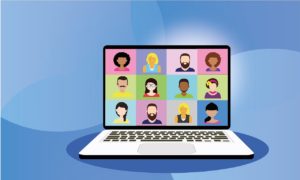We have all faced lots of change over the past year – both at home and at work – with many of us turning to Google for support and advice.
Influenced by what we’ve all been searching, Bupa’s health experts reveal 9 lessons we’ve learned from lockdown. As restrictions begin to ease our experts share their tips on how to form positive work habits as we look towards the future.
Lesson 1: Regular breaks are important
We experience burnout when we face high levels of stress and pressure at work, causing us to feel emotionally fatigued. Negative feelings towards work, lack of motivation and lower levels of productivity are all symptoms of burnout.
During 2020, Google UK searches for ‘burnout’ increased significantly – peaking at an average monthly search volume of 12,100.
 Regular breaks can help you to avoid burnout. Lauren Gordon, Behavioural Change Adviser at Bupa UK advises taking a five-minute break away from your desk every hour: “Rather than scrolling on your phone during your break, use this time to do some simple stretches or a short mindfulness session. This can boost your mood and increase productivity levels when you return to your desk.”
Regular breaks can help you to avoid burnout. Lauren Gordon, Behavioural Change Adviser at Bupa UK advises taking a five-minute break away from your desk every hour: “Rather than scrolling on your phone during your break, use this time to do some simple stretches or a short mindfulness session. This can boost your mood and increase productivity levels when you return to your desk.”
Spending time in the evenings doing something you enjoy and spreading your annual leave evenly throughout the year allows you to switch off from work and take a break from your workload for longer periods of time – both of which help reduce the effects of burnout.
Lesson 2: Challenging work keeps us engaged
Searches for the mental health condition ‘boreout’ increased significantly by 680% in 2020.
When you experience boreout, you may feel anxious, fatigued and you won’t feel challenged by your work. This is particularly common if your workload is repetitive.
 Pablo Vandenabeele, Clinical Director for Mental Health at Bupa UK Insurance says: “A key lesson we have learnt from experiencing boreout this year is the importance of talking to someone you trust about how you’re feeling.
Pablo Vandenabeele, Clinical Director for Mental Health at Bupa UK Insurance says: “A key lesson we have learnt from experiencing boreout this year is the importance of talking to someone you trust about how you’re feeling.
“Discussing your feelings with your manager and looking at any new responsibilities you can take on can help you to overcome boreout as well as promote your career development.”
As a manager spotting the signs of boreout (fatigue, lack of motivation and stress) early can help you to support your team and to know what works best for each employee.
Lesson 3: Workplace flexibility leads to a happier workforce
With many parents juggling home schooling and work commitments over the past year, flexibility has been more important than ever. Whilst schools may be back, a level of flexibility in the workplace is still very-much needed, particularly as we’re still navigating our way through the pandemic.
In March 2020, at the very beginning of the first lockdown many parents turned to Google for advice on balancing home-schooling and work commitments – searches for ‘working from home with kids’ with monthly search volumes peaking at 12,100.
Over the past year there has been an importance placed on striking a greater work-life balance, with 67% of the UK workforce agreeing their employers have been supportive.
Lesson 4: Healthy and nutritious lunches helps us tackle the afternoon ahead
Over the past year we have all been spending more time at home than ever before – making it easier to form unhealthy eating habits such as emotional eating and snacking on convenience foods.
Searches for ‘healthy lunch ideas’ have seen an increase over the past year with monthly search volumes peaking in May 2020 at 74,000.
 Victoria Evans, Wellbeing Consultant at Bupa UK and Registered Associate Nutritionist says, eating a healthy and balanced meal at lunch will help to boost your energy levels for the afternoon ahead.
Victoria Evans, Wellbeing Consultant at Bupa UK and Registered Associate Nutritionist says, eating a healthy and balanced meal at lunch will help to boost your energy levels for the afternoon ahead.
“Lunchtime meals that include a balance of fruit and vegetables, protein (eggs, fish meat or dairy), carbohydrates (potatoes, quinoa, rice and pasta) and healthy fats (olive oil and avocado) help to beat the post lunch time lull.
Why not treat yourself this lunchtime with a homemade soup, chilli or quinoa salad? All of these options will give you a much-needed energy boost.
Lesson 5: Too many video calls have left us feeling tired, anxious and stressed
Google searches for ‘zoom fatigue’ fluctuated during 2020. Zoom fatigue, describes the stress and burnout associated with too many video calls – after a year of video calls as a main method of socialising with each other this is something many of us have experienced.

Processing multiple faces and voices through the lens of a screen requires a lot of subconscious effort. Low video quality can also make it harder to understand facial expressions – meaning our brains must work harder to make up for the lack of communication signals.
For some there is also the additional worry of being interrupting by family members, distracting noises and poor internet connection. Similarly, if you have many meetings back to back there is less of an opportunity to take break away from your desk. All these factors can contribute to video fatigue.
Limiting the number of video calls each day to avoid zoom fatigue. Ask yourself does a video call need to take place – could you communicate via email, teams or skype messages?
Lauren Gordon, Behavioural Insights Adviser at Bupa UK, says, “Whilst it can be tempting to check your emails or complete another piece of work whilst on a video call, avoid becoming distracted by other responsibilities and focus on the task at hand. This will reduce any additional cognitive load’.
Lesson 6: Your WFH set up is important
Last year we had to quickly adjust to working remotely overnight with only one in three of us having access to a dedicated workspace.
A year on and new research from Bupa UK has revealed 63% of the UK workforce have suffered injuries to their neck, back, hips, knees and wrists as a result of their working from home environment.
Poor workspace set up can wreak havoc on your posture and lead to aches and pains. If you’re still working from home, try working from a desk or kitchen table if you have no dedicated workspace.
The study by Bupa UK also found many of us sit at our desks for too long – this can lead to muscle stiffness and pain. Try taking a break for your desk every 5-10 minutes to stretch your legs and rest your eyes -to reduce the risk of injury.
If you are experiencing discomfort whilst working from home, speak to your employer, GP or physiotherapist they will be able to help.
Lesson 7: Get creative with your WFH events
With social distancing restrictions in place virtual events are a great way for your team to stay connected.
In the build up to the 2020 festive season, Google UK searches for ‘virtual team building activities’ peaked at 4,400 in November.
There are lots of creative ways to host a virtual event for your team. From weekly coffee catch ups, post work drinks, a quiz to a workshop or webinar.
Before you begin to plan a virtual event, it’s important to consider the different personalities of your team. For example, some members of your team may prefer to join in without being on camera whilst others may have to work around other commitments such as childcare. This will help your event get off to a great start and put any anxieties at ease.
Lesson 8: Career development boosts confidence whilst working remotely
Last year searches for ‘online learning’ increased by 400% – with Google searches for ‘boreout’ also increasing during 2020, career development has given many of us something positive to focus on and reduce the effects of burnout.
Supporting your team in developing their skills not only boosts their confidence and motivation but also forms a resilient workforce -which is crucial during these unprecedented times.
Pablo Vandenabeele explains ‘learning a new skill doesn’t necessarily need to be work related, learning a new language or craft both count towards developing your skillset.’
As a manager you can lead by example and share any opportunities of online learning where you feel your team may enjoy or benefit from. However, it is also important to emphasise furthering your skills is not compulsory.
Lesson 9: A morning routine sets you up for a productive day
A morning routine that works for you is a great way to boost your productivity and energy levels for the day ahead.
With a year full of change, many of us may have found it hard to set a routine in the morning – and we’re not alone in this. In 2020, we saw consistently high search volumes for ‘morning routine ideas’, with the average search volume peaking at 8,100 in May 2020.
Lauren Gordon says “you can create a morning routine around behaviours you would normally do such as, make your bed, read the morning news, make a coffee and eat breakfast. However, you can also you can also try replacing your commute time with a new habit such as a morning walk.”
There is no one way to form a perfect morning routine. However, creating a routine that works for you is a great way of adding structure to your daily life – reducing stress whilst improving your sleep and time management.
Bupa will be hosting a panel discussion, led by Wendy Rose, Bupa’s Head of Strategic Relationships, at the virtual Workplace Wellbeing Conference, from 1-3 June 2021. The session, Women’s health & menopause, takes place at 13:00 on Thursday 3 June. Tickets to the conference are £120 + VAT, with 20% of the ticket price donated to conference charity partner, Mind.
Other speakers include former No. 10 director of communications and strategy Alastair Campbell; astronaut Major Tim Peake; Mind CEO Paul Farmer; Olympic gold medallist Amy Williams; award-winning campaigner Tom Dunning; HSE Principal Human Factors Specialist Phoebe Smith; and many more.
Click here to see the full Workplace Wellbeing Conference agenda.
Click here for more information and to purchase your ticket.
The Workplace Wellbeing Conference is part of Safety & Health Expo and Workplace Wellbeing Show Connect 2021, your first major opportunity to come together with the rest of the occupational health, safety & wellbeing community online from 1-30 June. The month-long, online event will make it easy for you to find health and safety products & services, connect with suppliers and access thought-leadership content from your own home or workplace. Connect 2021 is free to attend.
Safety & Health Podcast
Subscribe and tune in the Safety & Health Podcast to discover the latest issues facing the health and safety profession, and stay on-top of the developments affecting your role, from working at height, lone working and common workplace hazards, to safety culture, behaviours, occupational health and mental health and wellbeing.
In this episode, Heather Beach is joined by Stacy Thomson to discuss burnout, perfectionism and how to deal with burnout as an individual, as management and as an organisation.
Join the conversation today!

 Regular breaks can help you to avoid burnout. Lauren Gordon, Behavioural Change Adviser at Bupa UK advises taking a five-minute break away from your desk every hour: “Rather than scrolling on your phone during your break, use this time to do some simple stretches or a short mindfulness session. This can boost your mood and increase productivity levels when you return to your desk.”
Regular breaks can help you to avoid burnout. Lauren Gordon, Behavioural Change Adviser at Bupa UK advises taking a five-minute break away from your desk every hour: “Rather than scrolling on your phone during your break, use this time to do some simple stretches or a short mindfulness session. This can boost your mood and increase productivity levels when you return to your desk.” Pablo Vandenabeele, Clinical Director for Mental Health at Bupa UK Insurance says: “A key lesson we have learnt from experiencing boreout this year is the importance of talking to someone you trust about how you’re feeling.
Pablo Vandenabeele, Clinical Director for Mental Health at Bupa UK Insurance says: “A key lesson we have learnt from experiencing boreout this year is the importance of talking to someone you trust about how you’re feeling. Victoria Evans, Wellbeing Consultant at Bupa UK and Registered Associate Nutritionist says, eating a healthy and balanced meal at lunch will help to boost your energy levels for the afternoon ahead.
Victoria Evans, Wellbeing Consultant at Bupa UK and Registered Associate Nutritionist says, eating a healthy and balanced meal at lunch will help to boost your energy levels for the afternoon ahead.
Just waiting for number ’10’ to be up-graded to top of list “Accessibility Compliance” whether UK Government, HSE or International WCAG Website or ISO 30071.1 Display Screen Equipment “Colour Contrast Validation” enabling compliance with the last centuries Workers Health and Safety regulations from 1974 to 1998 PUWER Act apart from current 21st Century occupational health legislation including ISO 45001 Work Exposure Limits and ISO 45003 addressing Work-stress related Mental Health repetitive stress injuries….